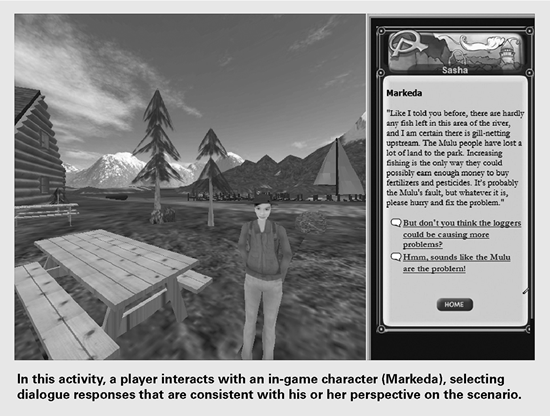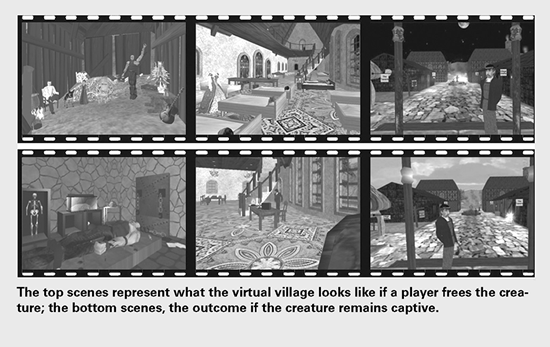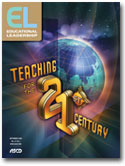Where can a 10-year-old have an impact on the world?
Answer: In a virtual world.
Video games, recently surpassing Hollywood films in annual sales, have become one of the most popular forms of entertainment. Yes, they are fun, but they also offer players a chance to take on new roles and experience worlds in which they learn and problem solve. Recognizing the power of this medium, designers are now creating games specifically for education. Vastly different from brightly packaged drill-and-practice software of the past, these games offer something new to students—entire worlds in which learners are central, important participants—worlds where what they know is directly related to what they are able to do and, ultimately, who they become (Gee, 2003; Gee & Levine, 2009).
In the games we design, children can become environmental scientists, investigative reporters, statistical consultants, and historians. By adopting a persona, or "avatar," they make choices that determine how events transpire and what characters in the game will do next. For example, in one of our scenarios, a student playing the game takes on the role of statistician, and in-game characters ask the student player to analyze data to determine whether surveillance cameras or an increased police presence will make the virtual town safer. The next time the student returns to this virtual town, he or she may encounter cameras on every building or a police officer on every corner. Accountability is not based on an external test, but on the consequences of one's choices.
In this context, students learn how to investigate and pose solutions—and they learn what it means to be historians, scientists, or mathematicians. Students often find a passion for curricular content and begin to see themselves as capable of solving interesting problems. We believe this kind of approach truly ensures that no child is left behind because it offers students opportunities to engage with curricular content and appreciate that content's value.
As part of our Quest Atlantis project (see www.QuestAtlantis.org), we have designed hundreds of gaming activities to teach disciplinary content, which have been used by thousands of children around the world. Through our study of students' practice, we have developed a new theory about how students best learn. What we seek to foster in students is something we calltransformational play. Each game involves a knowledge quest and interactive tasks that take place in one of 15 virtual worlds. Educators can go to www.QuestAtlantis.org, download Quest Atlantis for free, and try a sample unit. The themes of these worlds align with academic subject matter—such as statistics or persuasive writing—and each quest taps into subject knowledge. For example, we designed an aquatic park called Taiga World to host a unit on water quality (see fig. 1). Students are assigned tasks, such as making the water in the river safer for aquatic life. To complete the task, students need to know about water quality, including pH, dissolved oxygen, and turbidity. We view games like these as environments that make academic content a necessary tool and that position the learner as a hero who transforms a virtual world.
Figure 1. Screenshot of Taiga World, a Quest to Explore Water Quality
Merely playing a game does not ensure that a student is engaged in transformational play. To play transformationally, a player must become a protagonist who uses the knowledge, skills, and concepts embedded in curricular content to make sense of a fictional situation and make choices that transform that situation. Positioning students in this way sparks their interest, but equally important, leads to deeper engagement with content.
In transformational play, students become immersed in activities that engage them intellectually and push back on their thinking and actions. Rather than working on problems in which they must imagine the implications of their decisions (as in most project-based work), students experience consequentiality.
In Taiga, our game connected to a unit on water quality, a park ranger asks students to investigate what is causing fish decline in the virtual park and to come up with a solution (Barab, Zuiker, et al., 2007). Students might choose to outlaw logging in the park because logging causes erosion, or they might forbid farming near the river because a chemical runoff changes the water's pH. They experience the consequences of these decisions as the simulation takes them 10 years into the future. They might discover that the park has gone bankrupt because no farmers or loggers were paying taxes. Students can then reflect on the weaknesses of their initial solution and consider a solution that demonstrates a better balance between the needs of the ecosystem and socioeconomic issues.
Research indicates that such immersive technologies enhance student learning. In one comparison study, a teacher used Quest Atlantis games in a science curriculum with one student group and taught the identical curriculum to another group of students through traditional methods. The students who used Quest Atlantis learned significantly more science concepts than the traditional classroom students, showed higher engagement, and demonstrated increased intrinsic motivation (Arici, 2008; Hickey et al., in press). When these groups were tested two months later, the students who learned through the virtual game remembered more science content than the traditionally taught students did (Arici, 2008).
As one teacher who used the fractions unit in Quest Atlantis's math world noted:The kids [were] not [acting as] 5th graders. They had a task. They had a mission, and anytime you . . . invite the kids to be something other than a student, you're going to automatically see motivational gains. There's a lot more perseverance. There was a lot of reading to be done, but kids were sticking with it. If I handed them a textbook, I would not see the same endurance.
Our virtual quests expand on strategies associated with project-based curriculums. We focus on building game-based learning environments in which students play an important role, using academic knowledge to make decisions that influence, for better or worse, the designed storyline. Thus, these virtual spaces transform learners in three ways: (1) they transform a person from a passive recipient to an empowered actor, (2) they transform content from information that the learner has to remember to a tool that the learner can use to accomplish desired ends, and (3) they transform context from an assurance that "this knowledge will be relevant in the future" to a present reality that responds to the learner's actions.
A Promethean Task
We can best illustrate our approach through an example of how students interact within one of our virtual worlds, Digital Prometheus.
Our instructional goal in this unit was to foster persuasive writing by immersing students in ethical dilemmas inspired by Mary Shelley's Frankenstein. Once teachers assign the unit to their class, students can travel to a village named Ingolstadt. As they interact with local villagers, they develop a position about whether the local doctor (Dr. Frank) should be allowed to create an artificial life form in the hopes of finding a cure for the plague afflicting the town. Let's look at how playing Digital Prometheus engages students in interesting problems, makes curriculum content relevant, and teaches students that their content-influenced actions have consequences.
Establishing a Meaningful Role
Transformational play begins with a scenario that sets a goal. This motivates players and demands a deep understanding of content. In Digital Prometheus, each player first reads a letter sent to his in-game e-mail from his or her mother, pleading with the player to visit Ingolstadt, which is being destroyed by a plague. The message asks the player to talk to Dr. Frank and the local newspaper editor.
Using onscreen menus, players enter Ingolstadt and direct their avatars to travel through town. As players encounter characters, each player can interview them about what has been happening. Each character responds with a programmed script describing that person's experiences with the plague and giving an opinion about Dr. Frank's effort to stop the epidemic.
The core tension is that the doctor has created a living creature; he is experimenting on that creature with the hopes of finding a cure. The player's role as a persuasive writer is established when the editor of the paper asks him or her to build an argument about whether or not the doctor's behavior is ethical. Succeeding in this role requires that the player understand and apply persuasive-writing skills to collect appropriate evidence and compose a persuasive piece of writing.
Seeing That Content Matters
Knowledge connected to disciplines—such as investigative research and writing—serves as one of the most fundamental tools for making sense of the world and acting effectively in it.
In Digital Prometheus, as players interview citizens, they can store any 10 stories or quotes from characters they talk to in a digital "reporter's notebook." Because the notebook can hold only 10 quotes at a time, each player must decide which quotes provide the most compelling support for his or her argument. These quotes are eventually brought to an in-game "evidence sorter" that uses a preprogrammed scoring metric to evaluate the power of the collected quotes in relationship to the player's espoused argument about Dr. Frank. This evaluation helps the player understand how particular evidence supports particular arguments.
Once the evidence scores high enough on the convincing meter, the player can craft his or her editorial for the paper. The classroom teacher then reviews this article—in the guise of the in-game editor—and either accepts the work or requests revisions.
Discovering Consequences
Experiential consequentiality is threaded throughout Digital Prometheus. Soon after making their way to the doctor's lab, players encounter the first ethical dilemma of the unit: They decide whether or not to take a package from a crypt in the cemetery, a task that involves lying to the constable. The choice each player makes at this point affects the kind of reputation that character develops with both the doctor and the constable. This experience actually changes the content of the players' subsequent interactions with characters, ultimately affecting the type of evidence players can collect in support of their thesis.
Later in the game, each player submits a final piece of writing either arguing for the continuation of the doctor's experiments or advocating that the creature be granted the civil liberties that citizens of Ingolstadt enjoy. The player then experiences a world that has changed because of what the player recommended. A screenshot from the game (see fig. 2) shows two possible outcomes. The top three scenes portray a happy creature freed from the doctor's laboratory—but this creature is freed into a village that includes hospital beds filled with sick people and contaminated streets. The bottom three pictures show the outcome if the player had argued for keeping the creature enslaved: The village is a bright, healthy world, but the creature remains at the whim of the doctor's experimental probing.
Figure 2. Screenshots from the Digital Prometheus Game
Supporting Games in the Classroom
Although the games we design are more interactive than textbooks, they don't teach themselves. Quest Atlantis is not autopilot software. The real potential of educational games is realized only when teachers join students in interacting within these narratives, taking on new roles as they teach with these technologies. As we observe teachers using our virtual games, we've discovered that the following key actions enhance the instructional value of games.
Become a Character in the Game
Play alongside your students. It's essential for teachers to engage in virtual worlds because, even in this nontypical context, teachers still drive and shape student learning. As teachers play, they help the narrative unfold, motivate students with appropriate feedback at opportune times, and highlight key concepts embedded in the scenario. For example, as a player's "in-world mother" in Digital Prometheus, one teacher wrote to a student,I am very confused by your letter. What have you had to lie about? What is going on in Ingolstadt? What does the good Doctor have you doing? Please, follow the guidelines I have tried to teach you when writing an informative letter to your dear mother.
Support Core Concepts
In supporting content learning in virtual worlds, consider three ways of engaging with content: procedural, conceptual, and consequential. First, students may need help learning the procedures for completing tasks in the simulation. For instance, in Digital Prometheus, students select three pieces of evidence for each reason they use to support their argument. This activity has meaning only when teachers help students understand the difference between evidence and opinion. Second, students will need guidance to see the bigger picture and gather knowledge and tasks into a larger conceptual understanding. Strengthening students' conceptual knowledge might involve discussing key concepts, posing "what if" scenarios, or engaging individuals or the class in Socratic questioning. Third, consequential understanding occurs as teachers help students see the relevance of concepts to in-game situations and use those concepts to influence particular situations.
Use Failures to Teach
It's hard to get students to use both failures and successes to improve their thinking. Making mistakes is embarrassing, and students may not want to dwell on failures. But, just as in traditional teaching, bad decisions in a virtual scenario can be as illuminating as successes. If a student's actions lead to disastrous in-game consequences, help students use this feedback strategically, rather than penalizing them. When you first introduce a virtual game, tell students that they should expect to experience failure and have times when they must go back and start over. This will go a long way in coaching students to think about negative outcomes as an opportunity to improve rather than a message about failure.
Allow Off-Task Behaviors
Strike a balance between a tight focus on content that limits opportunities to explore and a too-loose structure in which students learn little academic content. The teachers we worked with were at first wary of allowing students to engage in any off-task behaviors in a virtual world. However, they soon realized that the time students spend exploring the narrative, interacting with characters, and even engaging with content not connected to assigned academic content is an important part of the overall effect of the medium.
Support Transfer of Learning
Although it's important to contextualize students' learning in terms of a particular story, we want students to see the value of the content they learn for other situations. If a learner never realizes how this virtual experience relates to real-life experiences, then the game playing will have been engaging but not productive. Becoming a hero within a virtual world should enable students to see themselves as people capable of using what they learn to successfully transform their world and to continue growing as scientists, historians, or writers.
By helping students connect virtual accomplishments to real-life scenarios, we lead learners closer to John Dewey's ideal of learning. Dewey (1938/1963) argued that education should be about giving learners the motivation and expertise to act in problem-filled contexts where applying that expertise makes a difference. Dewey's vision of schooling is quite different from the education experience most students have today, which involves amassing knowledge with the promise of someday bringing it to bear on the world. In contrast, when students solve problems in virtual scenarios, they get a taste of the real-world power of academic content.



